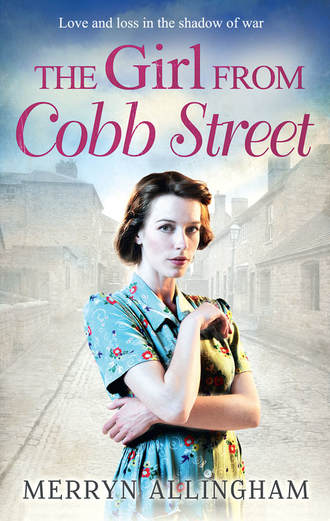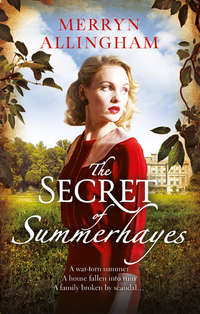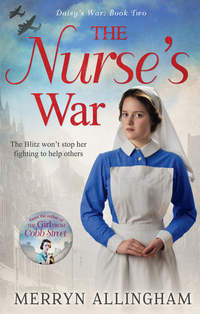
Полная версия
The Girl From Cobb Street
So that was Anglo-Indians as well as Indians and who else did Gerald say—sugar and jute planters? There was no end to the categories that were unwelcome. And she would be just as unwelcome if they knew the details of her history: a girl without parents, a girl sent into service when she was little more than a child, a girl who had burst with pride when she became a shop assistant selling perfume in a department store.
A loud gong cut their conversation dead, the sound outpacing the now raucous voices. Daisy drifted with the crowd towards an adjoining room where two long refectory tables stood parallel to one another, each bearing twenty place name cards and twenty sets of strictly ordered cutlery.
She found herself seated in yet another cane chair beside a man with a very large moustache. The cutlery bothered her but by dint of watching her fellow diners, she managed to acquit herself without incident. The first course was soup but a soup she had never before tasted. She glanced sideways to gauge her neighbour’s reaction. The soup seemed to catch in his side-whiskers and Daisy had to stop herself from watching in fascination as bubbles of the dark liquid slid slowly down his moustache.
‘As always, good mulligatawny,’ he said at last, when he’d emptied most of his bowl, ‘but God-awful bread, don’t you think, m’dear?’
The bread was the least of Daisy’s worries. The hot, spicy liquid was burning her throat and she had to force herself to finish what was in front of her.
‘Made with yeast from Bombay, you know. Comes in the post every month—no wonder it tastes like dung.’
She laboured painfully through the soup and then it was on to tough, curried chicken and another helping of hot spice. She filled and refilled her glass with water but nothing seemed to souse the flames.
‘Have you stayed on, then?’ was her companion’s next gambit.
‘Stayed on?’ That was a puzzle. ‘No, I’ve just arrived.’
‘Can’t have done, m’dear. Wrong time of the year.’
She was minded to contradict him but then recalled the various pieces of advice that had come her way. The man might be an eccentric but she must try to suit his humour. ‘Why is that?’ she asked, as though she genuinely wished to know.
‘It’s April. You couldn’t have arrived with the fishing fleet.’
‘I didn’t. I arrived with The Viceroy of India.’ And what on earth was the fishing fleet?
‘Bless your heart, the fishing fleet isn’t the name of a ship! It’s the girls. Girls just like you, husband hunting. They come out from home in the autumn and the young men go wild for them. Lots of ’em stay. Plenty of husbands to spare, you know. But come spring, those that haven’t made it, go back. Returned empties, we call them.’
‘I’ve not come to fish and I’m not a returned empty,’ Daisy said with dignity. ‘I came to India to marry. My husband is Gerald Mortimer.’
The man banged his spoon loudly on the table and laughed. ‘Sorry about the mix up. Young Mortimer’s gal then? Good! Difficult business but glad to see him hitched.’
She was unsure what he meant by a difficult business but he seemed well-meaning. And now that the dessert had arrived, it was taking all her attention. She eyed it hungrily. Two delicious woven toffee baskets, each filled with fresh mangoes and cream. It was the only part of the meal she’d managed without her eyes watering, and she had to stop her glance wandering enviously towards her neighbour’s plate. From several places along the table, she saw Gerald smiling. He was looking at her as though she had passed a test, though what that might have been, she had no idea.
Two decanters were placed in the middle of the two long tables, and she could just make out the writing on the silver labels which hung around each bottle neck: Marsala and Port. A duo of waiters made their solemn round of the guests, the women being offered the marsala and the men the port. When every schooner was filled, her neighbour stood with glass raised and all the men followed suit.
‘The King Emperor.’
There was a muffled rumble as everyone mouthed the words and held their glasses aloft. Daisy took a cautious sip. The wine was thick and sweet and clung to her tongue. The other women seemed to have no problem with it but she was delighted when she saw Mrs Forester rise from her seat at the head of the second table, and could stop pretending to drink.
‘Shall we, ladies?’
And then all the women stood up, with Daisy following uncertainly. Edith led the way through yet another polished oak door to a much smaller room and stood waiting on the threshold.
‘This is the snug, Daisy. We have our coffee here, and the men will join us after the port has finished doing the rounds. How are you enjoying this evening?’
She managed to murmur something that sounded like enjoyment, and then she was being taken by the hand and walked up to yet another young woman. ‘I would like you to meet my daughter,’ Edith was saying.
A smiling fair-haired girl was at her mother’s side. ‘This is Jocelyn. Jocelyn, this is Gerald’s new bride, Daisy.’
The girl’s red lips opened to an even broader smile, showing two rows of perfect, white teeth. Her deep blue eyes sparkled with pleasure as she dispensed with the hand Daisy had offered, and instead clasped her warmly around the shoulders. Immediately Daisy smelled it. The perfume. She knew that perfume—Shalimar. The very perfume Gerald had bought from her counter at Bridges. Could you get Shalimar in Jasirapur? Somehow she doubted it. So where had it come from? Gerald had said the perfume was for his aunt and she’d thought then that it was a strange choice for an older lady. Now it seemed she might have an explanation: it had not been for his aunt, if indeed he had one, but for this girl. And there could be one reason only for such an intimate gift, she decided, and that was courtship.
Jocelyn continued to talk cheerfully but Daisy hardly heard her. Her mind was too busy roving over remarks that had earlier made no sense. Was that what Rosemary Laughton had meant when she’d said Gerald’s marriage had come as a surprise, that the regiment had expected something else? Had they expected Jocelyn to be his bride? Surely not, for she was the Colonel’s daughter and from Daisy’s small experience of Jasirapur, the social hierarchy was even more rigid than in England. Jocelyn would be destined for a man of much higher rank than Gerald. She was allowing her imagination to run amok, she chided herself. Yet there was also Amelia Simmonds. She had been surprised by the marriage, so surprised that she’d been flustered into incoherence.
‘And what have you been doing since you arrived?’ Jocelyn was saying.
Daisy brought her mind back with a jerk and tried very hard not to show how bad she was feeling. ‘Not a great deal. I’m still getting used to the weather. But I did go to the bazaar today and bought material for new dresses. I find I don’t have sufficient lightweight clothing.’
‘No one ever has sufficient,’ the girl said, echoing Anish’s words. ‘Have you spoken to the durzi?’
‘I thought I might sew the dresses myself,’ she ventured, ‘but I didn’t think to bring patterns with me. Perhaps I can send for them.’
‘You don’t need patterns. All you need is a durzi, and I know the very man. I’ll bring him to you—tomorrow if you like.’
Her first reaction was to refuse, to make an excuse, say anything not to spend time with the woman she was beginning to think of as Gerald’s lover. But the girl was so pleasant and unaffected that rejecting her overture of friendship was difficult. She wondered if Jocelyn still cared for Gerald, and hoped it wasn’t the case. She might feel badly wounded, but she had no wish for the girl to be hurt too.
A second cup of bitter coffee was making the rounds before the men trooped through the door, some of them decidedly unsteady. Gerald was looking slightly flushed but came straight to her side.
‘You did well.’ She couldn’t imagine why, but if her husband was pleased, she was happy. ‘You were seated by the Colonel, you know,’ he whispered. ‘They must have thrown precedence out of the window tonight. Edith’s doing, I imagine. A great honour though. I guess it was because you’re fresh from England. It won’t happen again but the old boy seemed really interested in you.’
She was trying to think of a suitable reply when the room fell quiet. For some while it had been filled with loud chattering and the noise of chairs and stools being rearranged, until everyone was seated just where they wished. Then, breaking through the sudden hush that followed this burst of activity, a voice drawled, ‘She’s quite dark, don’t you think. Touch of the tar brush, I reckon.’
And what seemed like a hundred eyes swivelled in Daisy’s direction. She felt herself turn hot and red, and wanted more than anything to disappear through the battered floorboards. What had the woman meant? For naturally it had been a woman’s voice. The room buzzed furiously until Edith took charge of the situation, clapping her hands and silencing the wagging tongues.
‘Don’t forget, ladies, we’ll be taking the six o’clock train on Thursday. Come prepared with food and drink. And not too much luggage, please. The last thing we want are corridors overflowing with trunks.’
Voices subsided and passed on to quieter topics. But Daisy could not pass on. She felt Gerald sitting rigid beside her and couldn’t bring herself to look at him. The woman had meant her and everyone had known it. Was she too dark, too different? Her hair and eyes were a deep brown and her skin perhaps a shade darker than many of those she’d lived and worked beside, but she had never given much thought to her colouring. And neither had anyone else until this moment. What was the woman suggesting? That she was not English? She was as English as any one of them in this room, she thought indignantly. She had only one keepsake from her mother, a faded photograph but, beneath the starch of a nurse’s uniform, the woman portrayed was clearly English. But her father? Had he been English too? She had no idea. And she never would, for there had been only one name on the tattered birth certificate the orphanage had reluctantly handed to her when she left. She was an outsider and used to being so. As a poor girl without known family, it was inevitable. Miss Maddox’s friends had counselled her against favouring Daisy, and her fellow shop assistants had looked down their noses at a girl they knew instinctively was not one of them. But now apparently there was another reason for her exclusion. She was the wrong shade.
Mortified, she found she could no longer make conversation, no longer mouth the trivialities that seemed necessary to the evening. But rescue was close. Colonel Forester announced that he and Edith were about to leave and, as their departure was a signal for the rest of the company to make their way home, it was only minutes before Daisy was able to hide her burning face in the darkness of the night.
Rajiv had primed a solitary kerosene lamp to light the bungalow and she undressed by its shadows. Her heart was so full she could hardly get the breath to her lungs and tears were constantly pricking at her eyes. It had all gone so horribly wrong. She’d been highly nervous, terrified of making a mistake, but she had been managing the evening well. She’d smiled, she’d listened, spoken a little and swallowed food that made her feel ill. She had made a good impression or so she’d thought, and Gerald had been pleased with her. This would have been the time to tell him what she needed him to know. But then that one devastating remark and everything had been thrown into the air.
She unclasped the necklace she had been wearing and packed it carefully away among her clean underwear. Her only necklace, the string of pearls Miss Maddox had given her when she’d won the job at Bridges. How far away that seemed now. Then she hung the silk dress back into the wardrobe, feeling she never wanted to see it again. Despite all the hopes she’d invested in the garment, it had not brought her luck. Lifting her hairbrush, she began half-heartedly to pull it through waves that, as always, had grown limp from the sultry air. In the mirror she glimpsed Gerald framed in the doorway. He was fresh from the bathroom but his pyjamas were already damp with sweat.
‘Just come to say goodnight,’ he said awkwardly. ‘It’s hotter than ever, don’t you think? Best I give you a bit of space, my dear.’ And he turned to head towards the spare room.
‘Gerald!’
He looked back at her, a frown carved into his forehead. It was clear he didn’t want to stay and she felt too broken to try and detain him. But there was one thing she had to say before they parted.
‘I’m not going to Simla, Gerald.’
The frown deepened. ‘What do you mean, you’re not going?’
‘Just that. I can’t bear to be with those women.’
‘This is nonsense. What’s got into you?’ He leaned heavily on the doorframe and she remembered he had drunk lavishly.
‘I don’t want to spend the next few months hundreds of miles away from you and with no other company than people who hate me.’
‘No one hates you. If this is about that stupid remark, you should forget it. Margot Dukes is a bitch and well known for her unpleasantness. Nobody will take the least notice of her.’
‘It’s not just her. It’s all of them.’
And it was, she realised. Only a few of the women tonight had been unfriendly, several in fact had been amiable, but to be constrained to spend her days in such shallow, wearisome company was wretched. It would be weeks of trivia, of gossip, then if her knowledge of women living on top of each other was anything to go by, the inevitable fault finding, the backbiting. She would be the target, she was sure. And she was not strong enough to take it; she would buckle for certain. She tried telling herself that she was as good as anyone she’d met in Jasirapur; tried convincing herself that she should be proud of what she’d achieved against all the odds. But deep inside she knew that she didn’t really believe it.
Gerald started to walk towards her. She caught a glimpse of his figure reflected in the mirror and it was taut with tension. His voice, too, was tight and hard. ‘That’s ridiculous. I saw you talking quite happily with any number of the wives. You’ll go, and you’ll enjoy yourself.’
She shook her head and was near to tears again, but she was determined not to capitulate. As he drew closer, she rose to meet him. ‘If I go, Gerald, it won’t be willingly. You’ll have to bind and gag me to get me on that train.’
‘There’s no need for these dramatics.’ He shrugged his shoulders in a dismissive gesture. ‘I know this country far better than you, which is something you seem to forget. And if I tell you it’s for your own good that you go, you have to believe me.’
When she said nothing, his exasperation seemed to build in the silence and then spill over. ‘I’m your husband, Daisy, which means you’ll do as I wish.’
‘Why is it so important to you that I go?’
The question had come to her out of the blue but it left him looking discomfited. She could see he was struggling with the situation and wondered why. He moved even closer and took the hairbrush from her grasp, then captured both her hands in his. His voice had a note of tenderness she hadn’t heard before.
‘If you won’t do this for me, then do it for the baby. Simla is perfect. You must have heard that from everybody. And there couldn’t be a better place while you’re in this condition. You’ll love the gardens. You’ll love the walking. There are dozens of gentle strolls to take. And when you get too tired, you can call a rickshaw. At night—think of it—you’ll be able to sleep soundly in cool air. How can you not want to go? How can you deny our child the very best start in life?’
His tone had grown more coaxing with every word and she felt herself warm against his body. She wanted his arms around her, wanted to hold him so tightly he would never escape. Instead she eased her hands from out of his clasp. This was not the way she’d wanted to tell him, but she had no choice now.
‘There is no child, Gerald. There is no baby.’
CHAPTER FIVE
‘What!’
‘There was an accident …’ Daisy faltered.
His face had turned ugly, contorted. ‘So suddenly there’s no baby. There was a baby when you needed to get married, though, wasn’t there?’ His normally slim figure seemed to grow bulkier, to fill the room with threat. He raised his hands as if to shake her, then let them fall slackly by his side. ‘There never was a baby, was there,’ he said bitterly. ‘It was a tale you spun. A downright lie.’
No understanding then, no sympathy, no kind words. She tried to protest but her voice was weak, drained of conviction in the face of such hurtful injustice. ‘How can you think that?’
He turned abruptly and strode to the door, then turned again and marched back to her. ‘You’ve played me for a fool, that’s how. You thought you’d catch yourself a husband and what better way to do it than pretend a pregnancy. And I thought you naïve! You’re a professional, Daisy, I underestimated you.’
‘Don’t, Gerald, please don’t. You are wrong, very wrong. I was having a baby, I swear it, but there was an incident on the ship. There were prisoners, they were agitators—and they escaped from the ship’s gaol and ran amok. They cannoned into me and I fell down a flight of stairs. The next thing I knew …’
Her voice broke. The whole dreadful scene was there before her. Flailing limbs, the sickening thump as she crunched onto the hard deck, pounding feet, loud voices and then a softer one in her ear—Grayson—and then the wetness between her legs and the dreadful realisation. Her eyes brimmed with tears at the memory.
Gerald was still smouldering but her obvious distress silenced him for a moment. But only for a moment. ‘If you really did have this accident,’ he said roughly, ‘then why not tell me about it in Bombay. Why not tell me before we married?’
‘I planned to. I wanted to, but there was no chance.’
‘What complete rubbish!’ His scorn bit into her. ‘You could have stopped the marriage at any time.’
‘I was going to tell you what had happened when you met me at the port, but you weren’t there. You didn’t come as you promised. You sent Anish instead. And then when I arrived at the church, you were in no condition to talk.’
His face clenched. He did not deny the charge but he seemed so overwhelmed with anger at the turn his life had taken, it was making him deaf to the truth. ‘You could have found a way, if you’d wanted to. And if you hadn’t sent that telegram—’
For a moment this new line of attack fazed her. ‘But that was weeks ago.’
‘It doesn’t matter how long ago it was,’ he said harshly, ‘that did it for me. I was pushed into marrying, and you must have known I would be.’ And when she stood looking blankly at him, he burst out, ‘Don’t pretend you don’t know what you did. Sending a telegram to the regiment so every senior officer would read it and pass it to my Colonel. What chance did I have after that? I was summoned to account for myself—can you imagine what that felt like? Told the honour of the regiment depended on my doing the decent thing!’
‘I had no idea that would happen.’
‘Of course you hadn’t. It’s not an idea that would suit you. And it wouldn’t suit you, would it, to know that junior officers need the Colonel’s permission to marry. Though not this time, oh no. The baby saw to that. No questions asked, a wedding essential. Forester wasn’t at all happy. The army pays no marriage allowance until I’m twenty-six and that’s not until next year, but in the circumstances he had to agree.’
So that was what her companion at dinner had meant by a difficult business. She bowed her head, a small part of her appalled at the mayhem she’d set in motion. But the rest of her fought back. There had been a baby and it had been Gerald’s, she insisted to herself, and as much his responsibility as hers.
‘I wrote to you. The letters were addressed to you personally. I’m sorry if they never reached you.’
‘They reached me,’ he said grimly.
‘Then why didn’t you answer? It was only out of desperation that I sent the telegram.’
‘I was thinking what best to do.’ He looked down at the floor, refusing to look at her. ‘You gave me no time to consider—and then you did this stupid thing.’
She walked up to him, forcing him to look at her. ‘That’s not true, Gerald. I wrote every week for a month. You know I did.’
But he was intent on his own injury and it was as though she had not spoken. ‘Everyone on the station thinks I’m too young to be married. Did you know that? But I was forced into it. You forced me into it—and what was it all for? Nothing, absolutely nothing. No, I’m wrong. It’s been for something.’ His face glowered over her. ‘It has been to make me look a complete fool. Word will get around, you can be sure, and when no child appears, I’ll be the regimental patsy. How glorious that will be!’
In his agitation, he began again to pace up and down the room, his hands harrowing so fiercely through his hair she wondered that whole handfuls didn’t come loose. She sank down onto the bed and her heart did a curious little plummet. Curious because she felt nothing. She should be distraught, weeping, wailing. His brutal words should have shredded her. Instead she was completely numb. The man she had thought her rock in life was nothing more than shifting sand; the man who had sworn to love her for ever was swearing now that he had been misled, manipulated by her, driven to actions he found repugnant. Had
Конец ознакомительного фрагмента.
Текст предоставлен ООО «ЛитРес».
Прочитайте эту книгу целиком, купив полную легальную версию на ЛитРес.
Безопасно оплатить книгу можно банковской картой Visa, MasterCard, Maestro, со счета мобильного телефона, с платежного терминала, в салоне МТС или Связной, через PayPal, WebMoney, Яндекс.Деньги, QIWI Кошелек, бонусными картами или другим удобным Вам способом.






